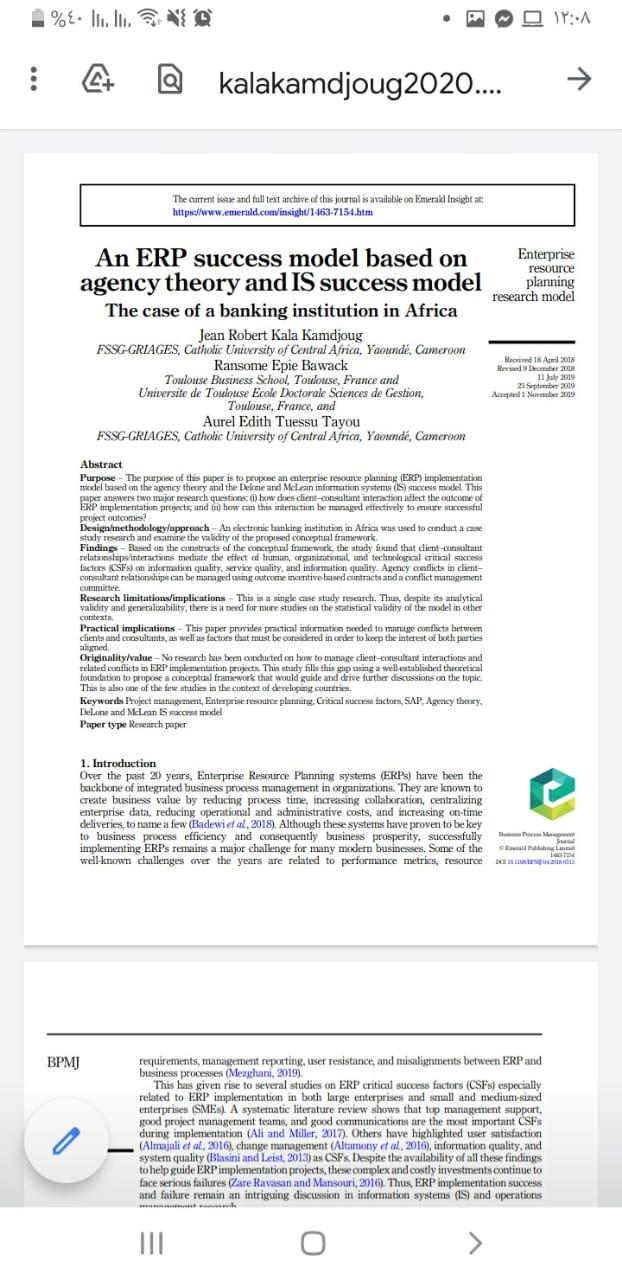Answered step by step
Verified Expert Solution
Question
1 Approved Answer
Back to this article (An ERP success model based on agency theory and IS success model (The case of a banking institution in Africa. Required:-
Back to this article (An ERP success model based on agency theory and IS success model (The case of a banking institution in Africa.

Required:- 1- the way of application 2- why it applied, 3-if it was convenient way to utilize.
: : kalakamdjoug2020... The current issue and full text archive of this journal is available on Emerald Insight at https://www.emerald.com/insight/1463-7154.htm Enterprise resource planning research model An ERP success model based on agency theory and IS success model The case of a banking institution in Africa Jean Robert Kala Kamdjoug FSSG-GRIAGES, Catholic University of Central Africa, Yaound, Cameroon Ransome Epie Bawack Toulouse Business School, Toulouse, France and Universite de Toulouse Ecole Doctorale Sciences de Gestion, Toulouse, France, and Aurel Edith Tuessu Tayou FSSG-GRIAGES, Catholic University of Central Africa, Yaound, Cameroon Red 18 April Reedener 2018 11 May 2019 21 Sber 2010 A1 November 2009 Abstract Purpose - The purpose of this paper is to propose an enterprise resource planning (ERP) implementation model based on the agency theory and the Delone and Mclean information systems (S) stess model. This paper answers two major research questions bow does client-consultant interaction affect the outcome of ERP implementation projects, and how this interaction be treinaged effectively to our stressful project outumes? Design/methodology approach - An electronic banking institution in Africa was used to conducta come study research and cumine the validity of the proposed conceptual framework the facts CSF) on inimation quality service quality, and information quality. Agency conflicts in client- cotestant relationships can be marged using outcome incentive based contracts and a conflict management committee Research limitations implications - This is a single cue study research. Thus, despite its atalytical validity and generalizability, there is a need for more studies on the statistical validity of the model in other contexts. Practical implications - This paper provides practical information needed to manage conflicts between clients and consultants, as well as factors that must be considered in order to keep the interest of both purties aligned, Originality/value-No research has been conducted on how to manage client-consultant interactions and related conflicts in ERP implementation projects. This his study fills this sop tasing a well established theretical foundation to propose a wnceptual framework that would guide and drive further discussions on the topic This is also one of the few studies in the context of developing countries Keywords Project management, Enterprise resource planning, Critical success factors, SAP Agency theory, Delane and Md. an cos model Paper type Research paper 1. Introduction Over the past 20 yenrs, Enterprise Resource Planning systems (ERP) have been the backbone of integrated business process management in organizations. They are known to create business value by reducing process time, increasing collaboration, centralizing enterprise data, reducing operational and administrative costs, and increasing on-time deliveries, to name a few (Badewid al, 2018). Although these systems have proven to be key to business process efficiency and consequently business prosperity, successfully implementing ERPs remains a major challenge for many modern businesses. Some of the well-known challenges over the years are related to performance metrics, ressource LT BPM) requirements, management reporting, user resistance, and misalignments between ERP and business processes (Merghari, 2019) This has given rise to several studies on ERP critical success factors (CSFS) especially related to ERP implementation in both large enterprises and small and medium-sized enterprises (SMEs). A systematic literature review shows that top management support, good project management teams, and good communications are the most important CSFS during implementation (Ali and Miller, 2017). Others have highlighted user satisfaction (Almajuli et al, 2016), change management (Altamony et al, 2016), information quality, and system quality (Blasini and Leist, 2013) as CSFs. Despite the availability of all these findings to help guide ERP implementation projects, these complex and costly investments continue to face serious failures Care Ravasin and Mansouri, 2016). Thus, ERP implementation success and failure remain an intriguing discussion in information systems (S) and operations III > : : kalakamdjoug2020... The current issue and full text archive of this journal is available on Emerald Insight at https://www.emerald.com/insight/1463-7154.htm Enterprise resource planning research model An ERP success model based on agency theory and IS success model The case of a banking institution in Africa Jean Robert Kala Kamdjoug FSSG-GRIAGES, Catholic University of Central Africa, Yaound, Cameroon Ransome Epie Bawack Toulouse Business School, Toulouse, France and Universite de Toulouse Ecole Doctorale Sciences de Gestion, Toulouse, France, and Aurel Edith Tuessu Tayou FSSG-GRIAGES, Catholic University of Central Africa, Yaound, Cameroon Red 18 April Reedener 2018 11 May 2019 21 Sber 2010 A1 November 2009 Abstract Purpose - The purpose of this paper is to propose an enterprise resource planning (ERP) implementation model based on the agency theory and the Delone and Mclean information systems (S) stess model. This paper answers two major research questions bow does client-consultant interaction affect the outcome of ERP implementation projects, and how this interaction be treinaged effectively to our stressful project outumes? Design/methodology approach - An electronic banking institution in Africa was used to conducta come study research and cumine the validity of the proposed conceptual framework the facts CSF) on inimation quality service quality, and information quality. Agency conflicts in client- cotestant relationships can be marged using outcome incentive based contracts and a conflict management committee Research limitations implications - This is a single cue study research. Thus, despite its atalytical validity and generalizability, there is a need for more studies on the statistical validity of the model in other contexts. Practical implications - This paper provides practical information needed to manage conflicts between clients and consultants, as well as factors that must be considered in order to keep the interest of both purties aligned, Originality/value-No research has been conducted on how to manage client-consultant interactions and related conflicts in ERP implementation projects. This his study fills this sop tasing a well established theretical foundation to propose a wnceptual framework that would guide and drive further discussions on the topic This is also one of the few studies in the context of developing countries Keywords Project management, Enterprise resource planning, Critical success factors, SAP Agency theory, Delane and Md. an cos model Paper type Research paper 1. Introduction Over the past 20 yenrs, Enterprise Resource Planning systems (ERP) have been the backbone of integrated business process management in organizations. They are known to create business value by reducing process time, increasing collaboration, centralizing enterprise data, reducing operational and administrative costs, and increasing on-time deliveries, to name a few (Badewid al, 2018). Although these systems have proven to be key to business process efficiency and consequently business prosperity, successfully implementing ERPs remains a major challenge for many modern businesses. Some of the well-known challenges over the years are related to performance metrics, ressource LT BPM) requirements, management reporting, user resistance, and misalignments between ERP and business processes (Merghari, 2019) This has given rise to several studies on ERP critical success factors (CSFS) especially related to ERP implementation in both large enterprises and small and medium-sized enterprises (SMEs). A systematic literature review shows that top management support, good project management teams, and good communications are the most important CSFS during implementation (Ali and Miller, 2017). Others have highlighted user satisfaction (Almajuli et al, 2016), change management (Altamony et al, 2016), information quality, and system quality (Blasini and Leist, 2013) as CSFs. Despite the availability of all these findings to help guide ERP implementation projects, these complex and costly investments continue to face serious failures Care Ravasin and Mansouri, 2016). Thus, ERP implementation success and failure remain an intriguing discussion in information systems (S) and operations III >Step by Step Solution
There are 3 Steps involved in it
Step: 1

Get Instant Access to Expert-Tailored Solutions
See step-by-step solutions with expert insights and AI powered tools for academic success
Step: 2

Step: 3

Ace Your Homework with AI
Get the answers you need in no time with our AI-driven, step-by-step assistance
Get Started


